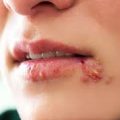Genital herpes is a sexually transmitted disease caused by two types of viruses namely the herpes simplex type 1 and herpes simplex type 2 which are both transmitted by having sexual contact (vaginal, anal, or oral sex) with an infected individual.According to the Center for Disease Control (CDC), about one in every six people aged 14 to 49 years have genital herpes in the United States, while the World Health Organization (WHO), estimates that about 140 million people primarily in the Americas, Europe and Western Pacific aged between 15-49 years are infected with HSV-1 virus. Click Here to see : Genital Herpes symptoms
How do you get a herpes virus?
Herpes simplex type 1, which is transmitted through oral secretions or sores on the skin, can be spread through kissing or sharing objects such as toothbrushes or eating utensils. In general, a person can only get herpes type 2 infection during sexual contact with someone who has a genital HSV-2 infection.
Can herpes be cured?
There is no cure for herpes. However, there are medicines that can prevent or shorten outbreaks. One of these anti-herpes medicines can be taken daily, and makes it less likely that you will pass the infection on to your sex partner(s).
How come herpes has no cure?
Once the virus is in a person’s system, it stays there for life. People can also be infected with the virus and have no symptoms. Right now, the sores and other symptoms of herpes are treated with one of several antiviral medications. There is no cure and there is no preventative treatment such as a vaccine. See : How Long Does a Herpes outbreak last
Can a woman give a man herpes?
More women than men are infected — one in four women compared with one in five men. One reason may be that the virus can infect a woman’s genitals more easily than it can a man’s. Genital herpes becomes more common as people age. The more sex partners people have, the more common it is, too.
Does herpes burn while peeing?
Genital herpes most often appears as one or more blisters on or around the genitals or rectum. Numbness, tingling, or burning in the genital region. A burning sensation while urinating or having intercourse. Painful urination, difficulty urinating, or a frequent need to urinate.
How long is herpes contagious?
HSV-1 is very contagious. You can spread the virus even when you don’t have any symptoms of a cold sore, though you’re usually most contagious when you have them. Cold sores are contagious until they go away completely, which usually takes about two weeks
Can herpes spread through urine?
HSV-I or gingivostomatitis, usually cause cold sores (herpes labialis) (1). HSV-I is usually spread through contact with the saliva of an infected person while HSV-II is transmitted through urine and genital secretions
Can herpes go away?
Yes. Genital herpes symptoms can come and go, but the virus stays inside your body even after all signs of the infection have gone away. The virus becomes “active” from time to time, leading to an outbreak. Some people have outbreaks only once or twice.
Does washing your hands kill herpes?
It is also a good idea not to touch your herpes sores directly because there is a possibility of passing the virus to other parts of the body. The herpes virus is killed easily with soap and water, so washing will remove any virus that gets on your hands or fingers.
What health problems can herpes cause?
Complications associated with genital herpes may include:
Other sexually transmitted infections. Having genital sores increases your risk of transmitting or contracting other sexually transmitted infections, including AIDS.
Newborn infection.
Bladder problems.
Meningitis.
Rectal inflammation (proctitis).
Can You Get Herpes From A Toilet Seat
Yes ! ,it possible for you to get Herpes from a toilet seat but the incidence is very rare .The Herpes Virus have a very short life span outside the human body but coming in contact with it while active on a toilet seat can result in an infection. How Sugar Mummies On Whatsapp are Killing Young Nigerians





